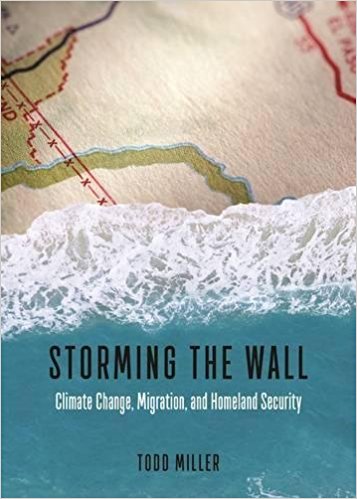
Record heat waves, droughts, floods, super storms, wildfires ravaging California, and now freezing temperatures consuming the East Coast. The world is waking up to the destructive realities of a changing climate. But while the Trump administration publicly espouses climate science denial, it continues to ramp up the border militarization efforts that began in the 1990s and continued through both Bushes and the Obama administration.
In his 2014 book, "Border Patrol Nation", author Todd Miller looked at the federal government's fastest growing paramilitary force and the real-world effects it has on the communities it nominally protects, but more often treats as a territory under military occupation. Miller's 2017 follow-up, "Storming The Wall: Climate Change, Migration, and Homeland Security", advances on this theme, illustrating ways that the U.S. Department of Homeland Security is actively ramping up for climate change. In typical perverse fashion, in fact, it's become the new normal in Washington – the exact opposite of a humanitarian response.
Occupy.com reached out to Todd Miller to discuss his latest work.
Jacob Resneck: In media discourse, we often don't connect the dots between militarization of the border and climate change. But your book draws some clear lines.
Todd Miller: The first thing that comes to mind is a quotation from a 2003 Pentagon-commissioned report that, while imagining a future, worst-case climate scenario, stated that, “Borders will be strengthened around the country to hold back unwanted starving immigrants from the Caribbean (an especially severe problem), Mexico, and South America.” In other words, you don’t have to go much further than the government's own documents, reports and assessments to find the clear connections. Another assessment by former National Security Advisor to Al Gore, Leon Fuerth, forewarned that in a 2.6 Celsius warming scenario by 2040, “border problems” would overwhelm U.S. capabilities “beyond the possibility of control, except by drastic methods and perhaps not even then.”
In "Climatic Cataclysm," the 2008 book where Fuerth’s assessment appeared, former Assistant Deputy Secretary of State Kurt Campbell wrote that it took a national security planner 30 years to develop a military system from the “drawing board to the battlefield.” These threat forecasts always involve discussions of climate change as a “threat multiplier” – in other words, who knows what those displaced, “desperate refugees” might do?
Already, according to the Internal Displacement Monitoring Centre, there are 21.5 million people displaced per year due to “climate-related hazards.” That number is higher than those on the move due to war. And the projections for future climate displacement is staggering, ranging from 150 million to one billion by 2050. This all comes in context of growing border regimes world-wide. Since the fall of the Berlin Wall in 1989, border walls have increased from 15 to 70, and in accelerated fashion post-9/11. This global lockdown increasingly divides the Global North from the Global South.
In other words if you are from the Global South and migrating internationally, and your house was devoured by the sea or your harvest withered in a drought, given that there is no climate refugee status, it is likely that these militarized walls and border patrols will be purposely placed to blockade you.
JR: This unprecedented human migration is well-documented. So what's been the U.S. government's response?
TM: One telling example of how the U.S. border apparatus has responded to environmental upheavals was the 2010 Haiti earthquake that left more than 220,000 people dead and more than one million displaced. While the United States did send assistance, it also sent 16 Coast Guard cutters to Haitian shores, set up an immigration detention center in Guantanamo Bay, and broadcast a message in Creole via a U.S. Air Force bomber that flew over the devastated country saying that if you leave Haiti you will be “arrested and returned.”
Indeed, the U.S. border enforcement has become massive, and given there is not climate status, this is what awaits a climate refugee. Since the early 1990s, the U.S. Border Patrol has gone from approximately 4,000 agents to 21,000. Annual budgets for border and immigration enforcement have soared from $1.5 billion to $20 billion in 2017 (if you combine Customs and Border Protection and Immigration and Customs Enforcement). There are now more than 650 miles of walls and barriers on the U.S. Mexico divide, reinforced by high-tech surveillance towers, radar, thousands of implanted motion sensors, and Predator B drones. The deployed strategy, known as Prevention Through Deterrence, makes places like the Arizona desert a “weapon” in the border arsenal, a place where thousands of people have crossed – and many have perished because it is impossible to carry enough water for journeys as long as seven to 10 days.
This was what was already at the disposal of the U.S. government when climate change was declared a national security threat in 2010. In 2014, the Department of Homeland Security inserted climate change as a top threat, among many others, in its top public document of mission known as the Quadrennial Review. As one part says, the United States will have to prepare its border for future “mass migrations” due to ecological upheaval and there was no mention of any sort of special visa. All signs point to a future of only more border fortification to come.
JR: We're seeing press reports that undocumented immigrants often stay away from shelters during a crisis because they fear Homeland Security agents descending on them as "low hanging fruit." Is this really happening or just a testament of how badly fear of officialdom is pervading these communities?
TM: When Hurricane Irma was about to nail Florida last September , the Polk County Sheriff insisted that police agents would be at shelters checking identification. Such a claim from an official was with the bravado of a direct threat, got national attention, and set off alarms in undocumented communities.
Most likely in a shelter situation, there won’t be a person checking citizenship status. However, as the above sheriff makes clear, no one can be sure. The uncertainty is psychologically pervasive in its own right. It isn’t far-fetched at all to think you might be arrested and deported, given the massive immigration enforcement web in the United States, and the collaborations between the DHS and local and state police forces – even when Immigration and Customs Enforcement and Customs and Border Protection insist that they will not target disaster shelters.
Which brings me to another example in August, when Hurricane Harvey was about to hit the Texas Gulf coast, and people were evacuating. The U.S. Border Patrol said that its checkpoints would remain open until the highways closed, in spite of the storm. This story underscores the other part of this story: The arrest, incarceration, and expulsion of undocumented people in the United States is happening, even during massive disaster situations, at all times. While there might not be a special targeting scheme happening in shelters, the entrapment apparatus is always very systemically in place.
JR: One part of the book that stood out to me was how, when communities are ravaged by storms or other disasters, they often come together rather and help each other rather than attack and loot their own communities – but that this spirit of cooperation is threatening of elites, who drive the narrative of sending in virtual peacekeeping forces to enforce the current order. Why are elites so threatened by communal cooperation? What does that say about our trajectory as a society confronting a global crisis?TM: There is a concept coined by disaster sociologists called “elite panic.” In disaster situations elites, politicians, and often media depict a world in the throes of chaos, threatening the power structure, justifying incursions of police and military. However, what hundreds of studies by social scientists have shown is that people in such situations tend to become more cooperative, not more violent. People are more prone to altruism and heroism, even with complete strangers. The panic really comes from the elite themselves.
Applying this “panic” to the forecasts for climate breakdowns, there emerges a sort of elite hyper-anxiety about the future. A preparation of military forces, including border and immigration forces, for these climate scenarios of devastating hurricanes, floods, and droughts has become the name of the game, in a sense, and also fuels a large profit-driven homeland security industry. (The idea that profit is being made from massive disasters, conflicts, and oppression should not be discarded.) Instead of reading a situation as communal cooperation, elites read a situation as a threat to be countered or smashed. And thus, instead of seeing climate change’s solution as one that requires people to be in cooperation across borders, a world of walls is envisioned.
Todd Miller is an author and independent journalist. "Storming The Wall" (City Lights Publishers) is his second book. It is available for purchase here.
3 WAYS TO SHOW YOUR SUPPORT
- Log in to post comments















